Overview
This article delves into the complexities surrounding CEO compensation in startups, acknowledging the challenges that many face in balancing competitive pay with the financial realities of their businesses. We understand that elements such as industry standards, funding stages, and equity compensation play a crucial role in attracting and retaining talent. By fostering effective remuneration strategies, we can nurture a culture of trust that aligns CEO interests with the long-term goals of the organization. It’s essential to recognize that these factors not only impact the bottom line but also the emotional landscape of the teams involved, creating a supportive environment where everyone can thrive.
Introduction
In the ever-evolving landscape of startups, CEO compensation plays a pivotal role in shaping the trajectory of emerging companies.
We understand that as the dynamics of industries shift and market conditions fluctuate, it can be challenging for founders to navigate the intricacies of how startup leaders are compensated.
This understanding is essential for attracting and retaining top talent.
From the allure of equity packages to the nuances of salary benchmarks, various factors influence how much these key executives earn.
This article delves into the complexities of CEO compensation in startups, exploring the components of compensation packages, the significance of equity, and the emerging trends that are reshaping the way these leaders are rewarded.
As many of our members have experienced, in a competitive environment where every decision counts, grasping the fundamentals of compensation strategies can be the key to fostering a thriving startup culture.
The Landscape of CEO Compensation in Startups
The environment surrounding CEO compensation in startups is intricate, shaped by numerous factors such as the firm's growth phase, industry trends, and prevailing market conditions. In 2025, we see that CEO compensation varies notably by industry, reflecting the distinct challenges and opportunities each sector presents. For instance, emerging companies in technology and healthcare often offer more generous remuneration packages compared to those in retail or service sectors, influenced by the competitive landscape of talent acquisition in these fields.
Recent data reveals that the average CEO salary in new enterprises has seen a significant increase, with many organizations now offering base salaries that align more closely with those of established firms. Yet, the allure of equity compensation remains a vital aspect of CEO compensation packages, as it provides a pathway for substantial financial rewards tied to the organization's performance. Equity options, including stock options, performance shares, and restricted stock awards, are becoming increasingly prevalent, allowing new companies to attract and retain top talent without straining their cash flow.
Factors that influence CEO compensation in new companies encompass the company's valuation, funding stage, and geographic location. For example, companies valued between $25 million and $50 million have observed a rise in in-state hiring, with the rate climbing from 37% in 2022 to 49% in 2024. This trend underscores the importance of local talent acquisition strategies in shaping pay structures.
Effective remuneration strategies often involve a blend of competitive salaries and robust equity offerings tailored to the specific needs of CEO compensation in startups. Case studies from notable companies illustrate how innovative remuneration models can enhance employee engagement and boost performance. Organizations that prioritize transparency in their compensation practices tend to foster a culture of trust and teamwork, which is essential for overcoming the challenges of the entrepreneurial landscape.
Market conditions also significantly influence CEO salaries. During times of economic uncertainty, startups may opt for more cautious remuneration packages, focusing on long-term sustainability rather than immediate financial rewards. Conversely, in a flourishing market, there is typically a push for more assertive remuneration strategies to attract high-caliber leadership.
As Akim Arhipov, founder of fff.club, emphasizes, "monetary superpowers should be accessible to everyone," highlighting the importance of equitable remuneration practices. In summary, grasping the nuances of CEO compensation in startups is essential for founders aspiring to build successful companies. By striking a balance between competitive pay and the financial realities of their businesses, founders can develop remuneration packages that not only draw in top talent but also align with their long-term strategic objectives.
The case study of fff.club illustrates how collaboration and educational resources can enhance investment strategies, further highlighting the importance of community involvement in shaping effective remuneration practices.
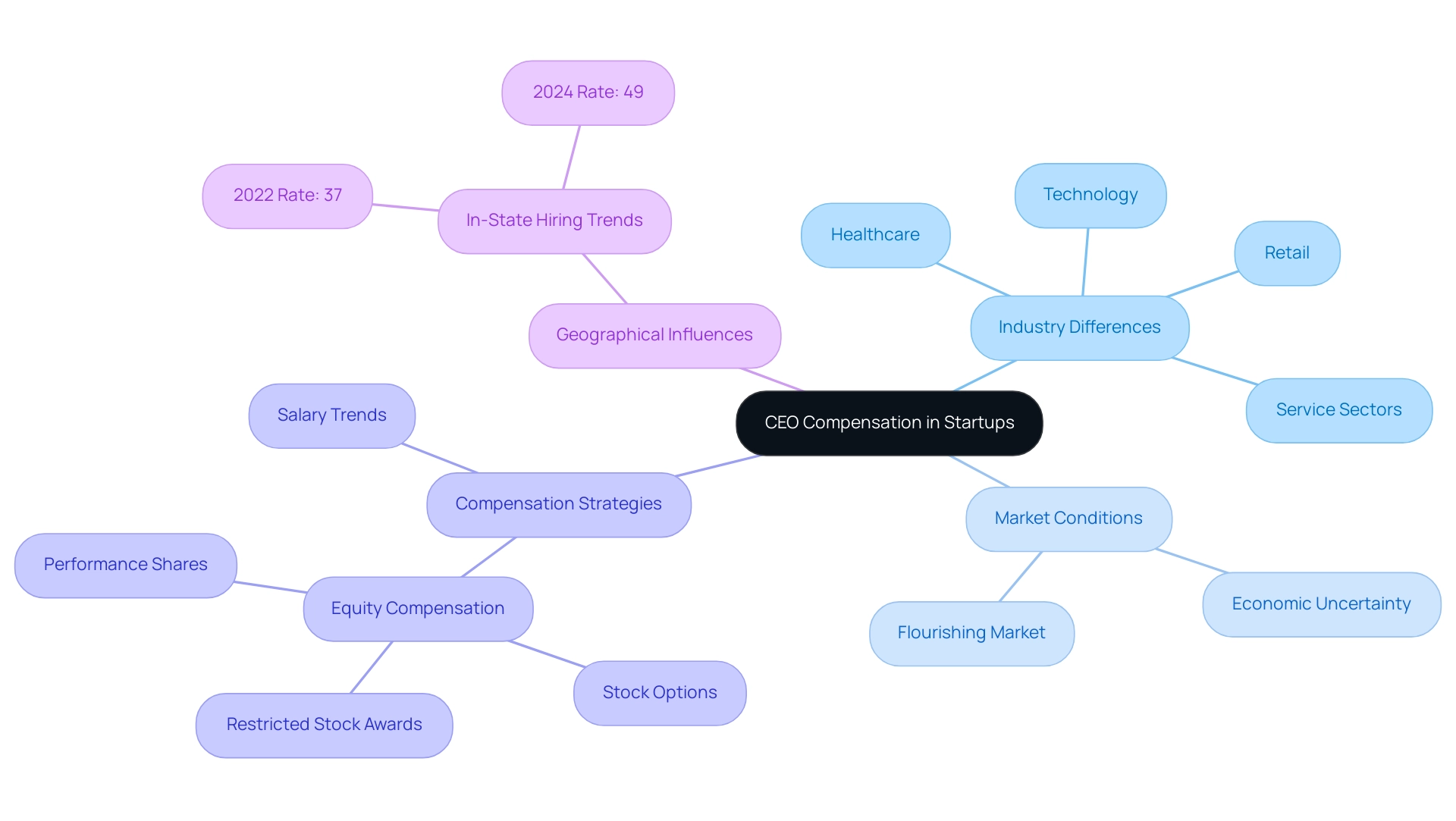
Key Factors Influencing Startup CEO Salaries
Several critical factors shape the salaries of startup CEOs, each contributing to the overall compensation landscape:
-
Company Size: As startups grow, the complexity of operations and the expectations placed on leadership increase. We understand that larger emerging companies often offer higher salaries to attract and retain experienced executives capable of managing these expanded responsibilities.
-
Funding Stage: The phase of funding plays a pivotal role in determining CEO remuneration. Typically, CEO compensation startup levels are lower for early-stage companies compared to their counterparts in later funding rounds. This disparity arises because funding availability directly influences salary budgets, with later-stage companies often having more financial resources to allocate towards CEO compensation startup.
-
Industry Norms: Compensation standards can vary significantly across industries. For example, tech companies frequently offer more competitive salaries compared to those in traditional sectors, reflecting the high demand for skilled leadership in the rapidly evolving tech landscape. The energy sector, for instance, saw substantial growth, with hires surpassing departures by 1.8x in early 2024, which may affect salary strategies in related startups.
-
Geographic Location: The cost of living in different regions also impacts salary levels. Urban areas, where living expenses are generally higher, tend to offer more substantial salary packages to attract top talent.
In the context of regulatory influences, public enterprises are required to hold shareholder votes on executive pay at least once every three years due to the Dodd-Frank Act. This regulation emphasizes the significance of transparency and accountability in payment practices, which can also resonate with startup founders aiming for equitable remuneration structures.
By understanding these factors, founders can establish competitive yet sustainable salary structures for CEO compensation startup that align with their organization's growth trajectory and market conditions. This strategic method not only helps in drawing the right talent but also guarantees that remuneration stays in harmony with the company's economic status and long-term goals. As Akim Arhipov, founder of fff.club, stresses, "Financial superpowers should be accessible to everyone," underscoring the significance of fair remuneration practices in promoting a just and inclusive business environment.
Furthermore, advisory companies such as Kruze Consulting offer essential monetary services to new businesses, assisting them in managing accounting, tax, and finance matters, including payment structures. By utilizing such expertise, founders can make informed choices that improve their overall remuneration strategies.
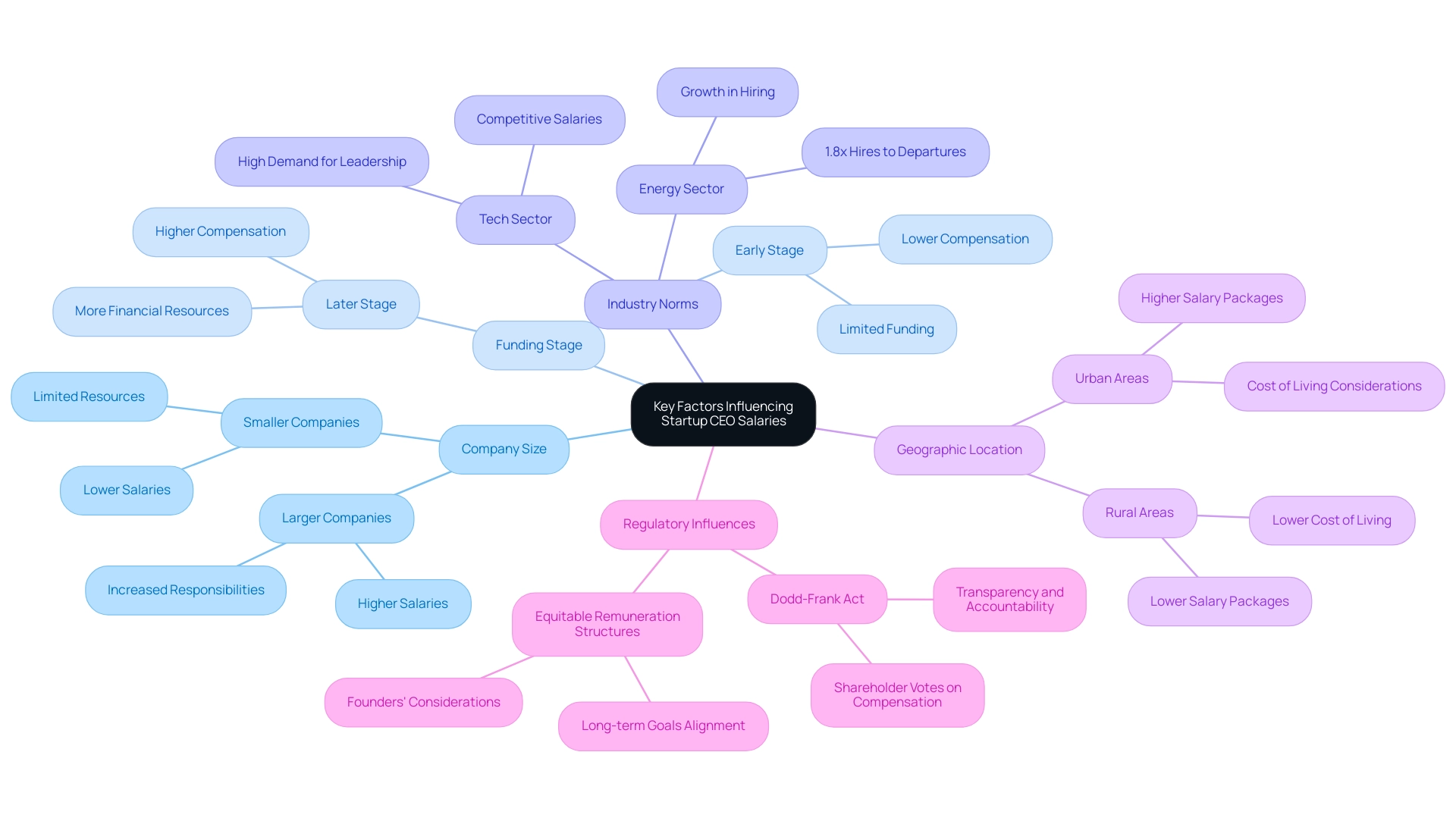
Understanding the Components of CEO Compensation Packages
CEO remuneration packages in new ventures present a complex landscape, often comprising several key components that reflect both the financial realities of the business and the essential need to attract top talent.
-
Base Salary: This fixed annual salary lays the groundwork for financial stability for the CEO. In 2025, the average base salary for new venture CEOs is notably lower than that of their corporate counterparts, often reflecting the company's early-stage funding and resource constraints. Many of our members have shared that while the average new business CEO earns a base salary considerably lower than their corporate equivalents, they frequently obtain equity that could be valued at multiple times that figure.
-
Equity Rewards: An essential aspect of new business remuneration, equity rewards consist of stock options or shares that align the CEO's interests with the company's long-term success. In the startup ecosystem, CEO compensation is particularly important, as potential equity value can far exceed base salary, motivating CEOs to drive growth and innovation. As Akim Arhipov, founder of fff.club, emphasizes, the commitment to inclusivity reinforces the belief that economic superpowers should be accessible to everyone, highlighting the importance of fair remuneration structures in attracting talent.
-
Performance Bonuses: These additional monetary incentives are tied to achieving specific business goals, such as revenue targets or product milestones. Performance bonuses not only recognize achievement but also encourage CEOs to concentrate on key performance metrics that enhance the organization's overall well-being.
-
Benefits: Comprehensive benefits packages, including health insurance, retirement plans, and other perks, enrich the overall remuneration offering. These advantages are crucial for drawing in and retaining skilled individuals, particularly in competitive markets.
Founders must strategically balance these elements to create appealing remuneration packages that are sustainable for the company's economic well-being. Effective equity remuneration strategies, as noted in the Startup CEO Salary Report, stress the significance of aligning CEO compensation with organizational performance and market standards. This method not only helps in attracting skilled individuals but also nurtures an environment of collective achievement, where the CEO's financial rewards are directly connected to the company's expansion.
Expert views highlight the importance of equity rewards in new ventures, with many supporting a framework that emphasizes long-term value generation over prompt monetary disbursements. Mihkel Torim from LHV highlights the club's dedication to providing members with essential insights and resources for making informed choices, which pertains to how new enterprises can offer thorough remuneration packages that conform to industry benchmarks. By establishing considerate remuneration frameworks, founders can manage the intricacies of attracting and keeping top talent while ensuring their venture remains financially sustainable.
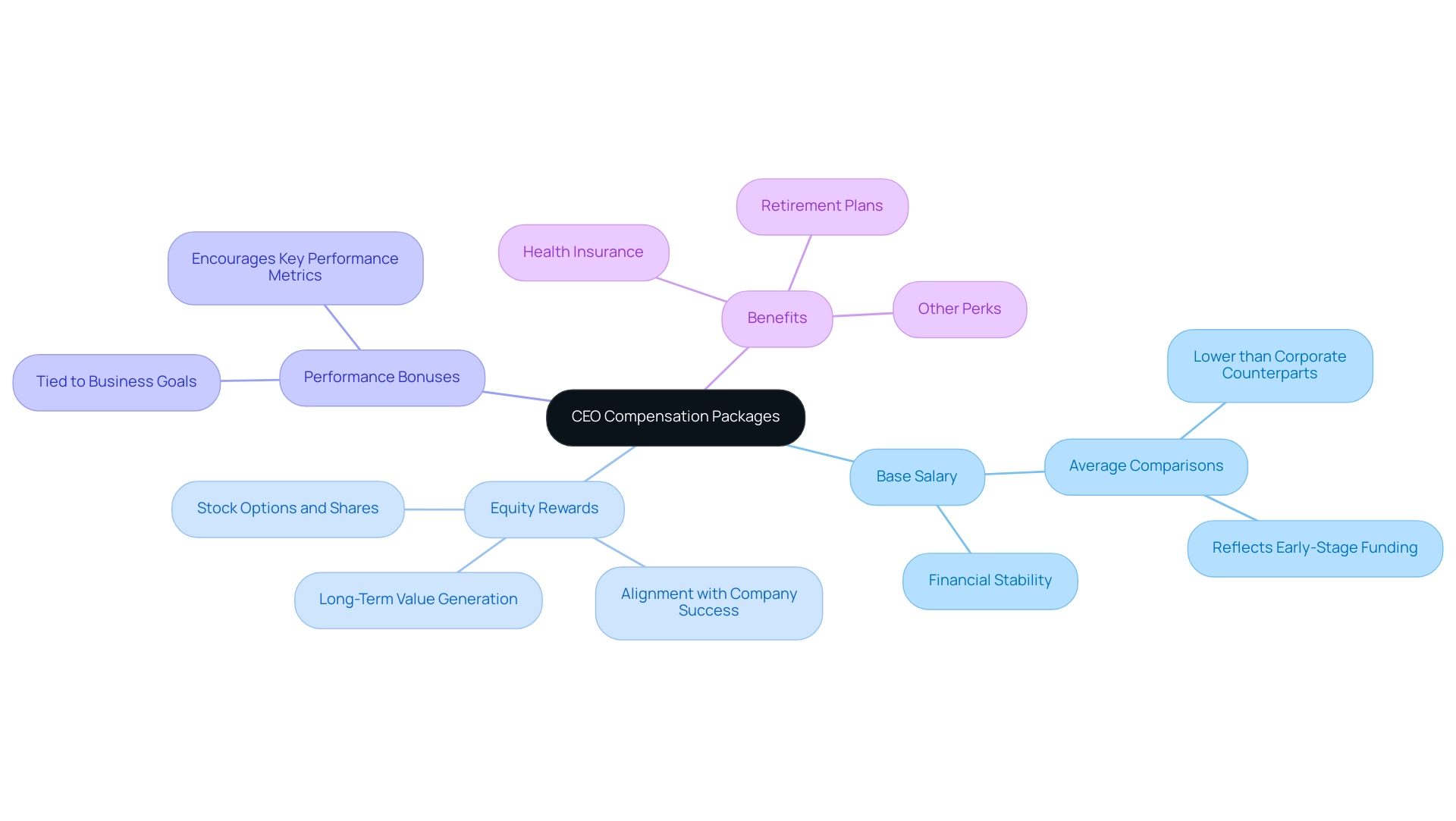
The Role of Equity Compensation in Startup Success
Equity rewards are fundamental to the entrepreneurial ecosystem, serving not just as a monetary incentive but also as a catalyst for fostering a sense of ownership. This understanding is crucial when we consider CEO compensation in startups, especially among CEOs and key executives. By incorporating equity into compensation packages, founders can unlock several strategic advantages:
-
Attract Top Talent: Many high-caliber candidates are drawn to the potential for significant financial rewards tied to the company’s success. For instance, in late-stage startups, a P3 software engineer might receive an equity grant that can reach up to 15% of their base salary, while a P3 account executive could see grants around 11.3%. This potential for substantial upside often becomes a decisive factor for candidates weighing multiple offers.
-
Align Interests: The framework of CEO compensation effectively aligns the financial interests of the CEO with the overall performance of the organization through equity compensation. This alignment fosters a shared vision for growth, motivating leaders to drive the organization toward success. As the organization flourishes, the value of the equity held by the CEO rises, creating a powerful incentive to prioritize long-term performance over short-term gains.
-
Retain Key Executives: Implementing vesting schedules for equity grants encourages long-term commitment from CEOs, which is vital for stability in leadership. By requiring them to remain with the organization to fully realize their equity benefits, companies can cultivate continuity—an essential factor for navigating the challenges of growth.
The significance of equity rewards as part of CEO compensation in a startup extends beyond mere financial incentives; it plays a crucial role in enhancing a company’s competitive advantage in attracting and retaining top talent. For example, early employees often receive a disproportionate amount of equity—typically ranging from 1-3%—to acknowledge the risks they embrace by joining a startup at its inception. Best practices recommend evaluating the risk each employee assumes rather than arbitrarily assigning equity, ensuring fair compensation that reflects their contributions.
Moreover, as Mitan Patel, a specialist in the field, observes, 'Share purchase plans have long been a preferred method for organizations to distribute ownership on a broad basis.' In recent years, interest in share purchase plans has surged, as companies strive to offer benefits that cater to all employees, drive engagement, and improve retention. This trend underscores the growing acknowledgment of equity rewards as a vital tool for nurturing a motivated and dedicated workforce.
In summary, CEO compensation is not merely a financial tool; it serves as a strategic resource that can significantly impact a new venture’s ability to attract and retain talent, align interests, and ultimately drive success in a competitive landscape. With a community of over 410 tech professionals at fff.club, discussions around equity remuneration resonate deeply, as members share insights and strategies that enhance their investment decisions and foster a richer understanding of wealth management.
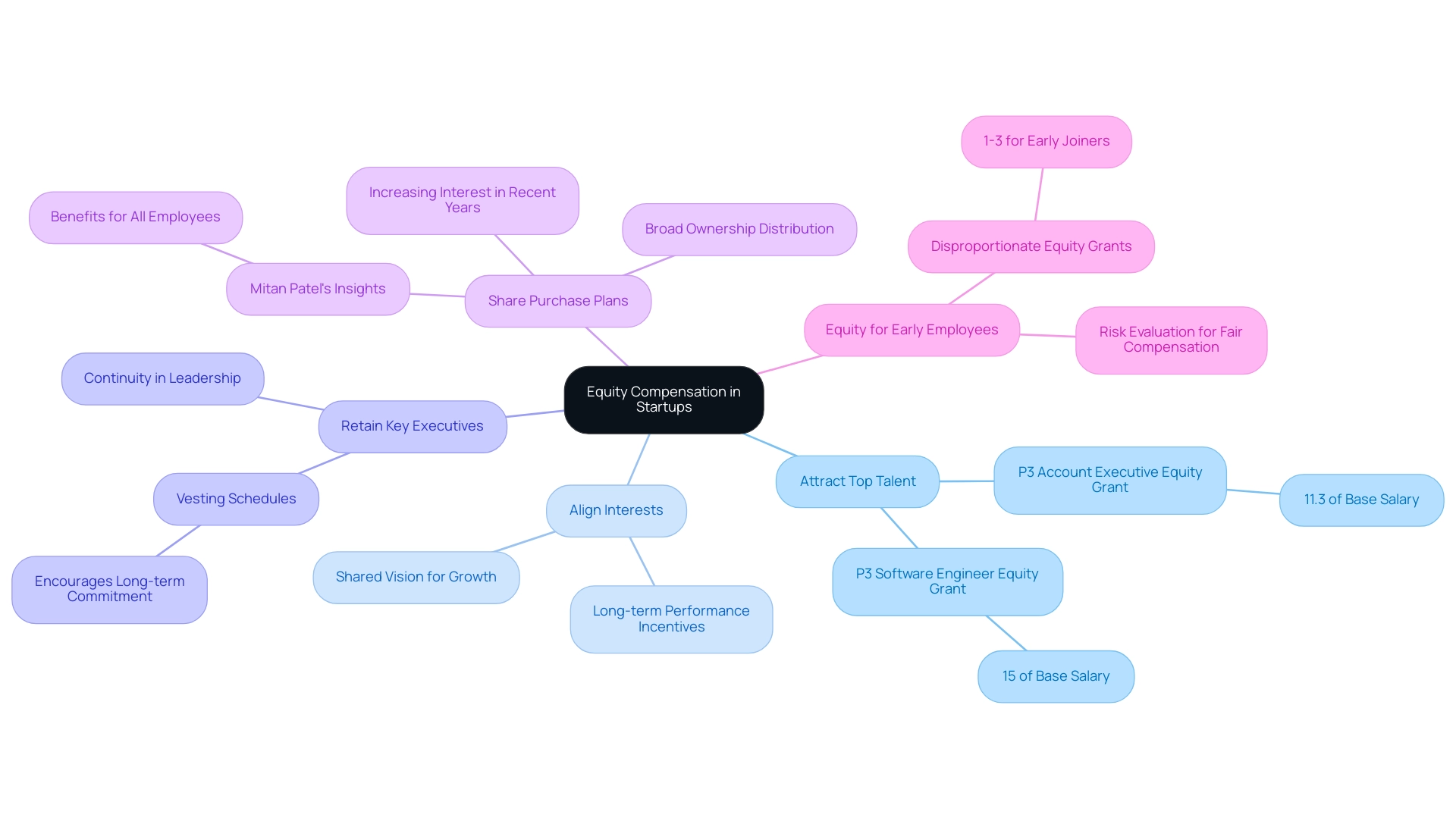
Navigating the Challenges of CEO Compensation Discussions
Founders often face significant challenges when navigating discussions around CEO compensation in startups, especially in the dynamic landscape of 2025. Recognizing these challenges is the first step toward effective solutions.
-
Transparency: Open communication about payment structures is essential for building trust and alignment among stakeholders. Transparency not only fosters a cohesive team but also enhances the credibility of leadership in the eyes of both investors and employees. It’s important to note that Emerging Growth Companies (EGCs) are entirely exempt from disclosure requirements, which can complicate efforts to maintain transparency in this sector.
-
Market Comparisons: For founders, benchmarking CEO salaries against industry standards is vital. This practice helps to avoid the pitfalls of overpaying or underpaying, which can lead to dissatisfaction among team members and investors. By understanding the competitive environment, founders can make informed decisions that reflect both the significance of the role and the economic realities of their startups.
-
Investor Expectations: Balancing remuneration with investor expectations presents a unique challenge. Founders must justify compensation packages that align with organizational performance and growth metrics. This requires a nuanced understanding of the startup's economic condition and the expectations of its investors, ensuring that CEO compensation is perceived as a strategic investment rather than merely a cost. As Ken Gibson, Senior Vice-President of The VisionLink Advisory Group, insightfully points out, effective rewards strategies are essential for aligning executive pay with company goals.
To navigate these challenges effectively, founders should engage in thorough preparation, maintain open dialogue with stakeholders, and remain flexible in adjusting remuneration based on feedback and evolving market conditions. This proactive approach not only enhances the investment experience but also aligns with the principles of inclusivity and collaboration championed by communities like fff.club, where financial empowerment is accessible to all members. For instance, informal networking events, such as the golf outing at General’s Retreat sponsored by UBS, can spark valuable conversations about remuneration strategies, reinforcing the importance of community involvement in addressing these challenges.
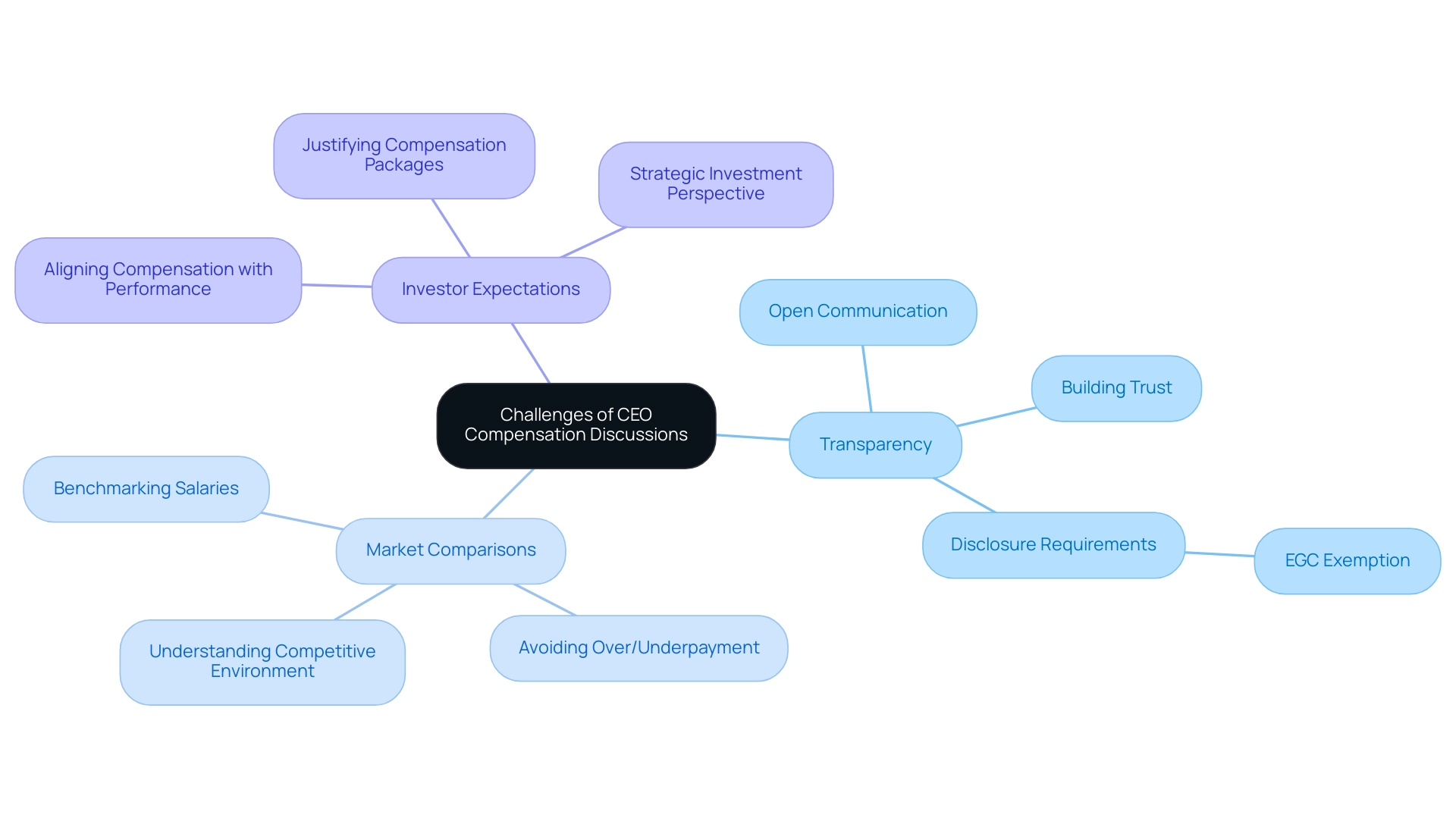
Emerging Trends in Startup CEO Compensation
The scenery of CEO compensation in startups is constantly evolving, reflecting the vibrant essence of the entrepreneurial ecosystem. However, we understand that navigating this landscape can be challenging. Key emerging trends include:
-
Increased Focus on Long-Term Incentives: Many startups are recognizing the importance of integrating deferred compensation and performance-based equity into their compensation packages. This shift aims to align the interests of CEOs with the long-term goals of the company, fostering a culture of sustained growth and accountability. By linking a segment of CEO compensation to performance indicators, new companies can encourage their leaders to focus on strategic initiatives that generate value over time. As Tony Hsieh, CEO of Zappos, famously stated, "Chase the vision, not the money; the money will end up following you," highlighting the significance of aligning rewards with long-term vision and values.
-
Greater Transparency: In response to demands from investors and stakeholders for clearer remuneration structures, startups are adopting more transparent practices related to CEO compensation. This trend not only builds trust but also enhances the company's reputation, making it more attractive to potential hires. We understand that transparency in remuneration can also mitigate risks associated with cash flow problems, which were identified as a primary reason for business failures in 2023. By ensuring that payment structures are clear and justifiable, startups can create a sustainable financial environment that includes considerations for CEO compensation.
The integration of ESG criteria is increasingly influencing CEO compensation in startups, as environmental, social, and governance factors impact remuneration packages. Startups are acknowledging the significance of aligning their remuneration strategies with broader societal values, which can enhance their appeal to socially conscious investors and employees. This integration reflects a commitment to responsible business practices and can positively impact long-term performance.
Staying informed about these trends is vital for founders looking to create competitive remuneration packages that address CEO compensation. We recognize that this not only draws top talent but also satisfies the changing expectations of stakeholders. For instance, a case study on negotiating initial salaries emphasizes the significance of customizing job applications to showcase pertinent skills and experiences, balancing fixed salaries with equity options, and negotiating regular pay reviews, especially in high-cost living regions. The conclusion derived from this case study is that CEO compensation varies and depends on multiple factors, including the candidate's qualifications and the financial situation of the business.
By providing competitive packages that may include equity rewards, startups can effectively attract and retain talent, which is crucial for addressing CEO compensation amidst challenges such as competition and a weak founding team. Notably, last year, about 83.8% of new hires were still in their roles at the end of the year, highlighting the critical role of effective compensation strategies in retention.
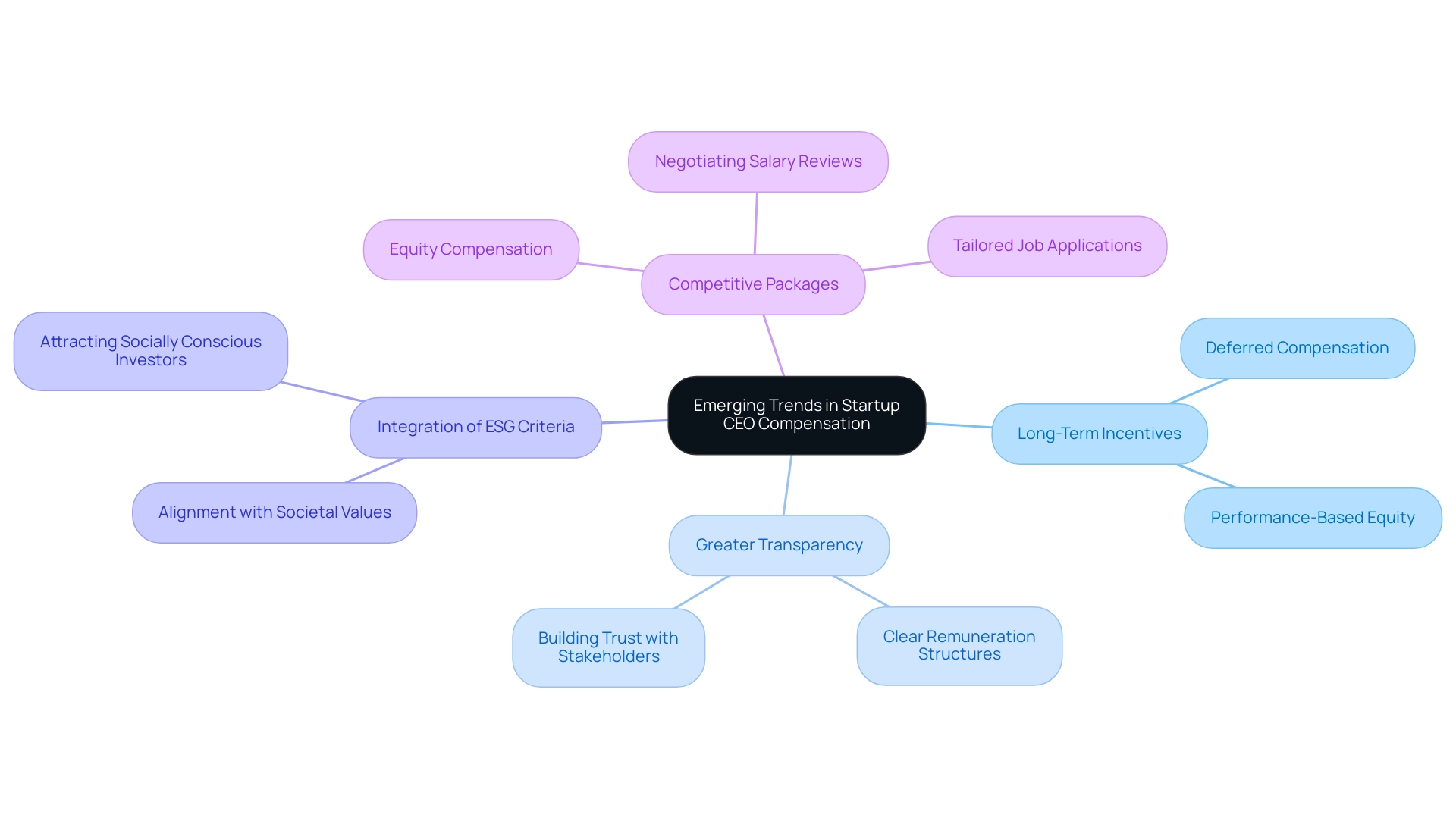
Conclusion
Navigating the complexities of CEO compensation in startups is not just a financial necessity; it is essential for nurturing a thriving entrepreneurial environment. We recognize that compensation packages can feel overwhelming, encompassing base salaries, equity options, performance bonuses, and benefits. Each of these components plays a vital role in attracting and retaining top talent, especially in an industry where competition for skilled leaders is fierce.
Equity compensation emerges as a powerful motivator, aligning the interests of CEOs with the long-term success of the company. By offering equity, startups not only incentivize their leaders but also foster a profound sense of ownership that can drive the organization forward. Moreover, understanding the various factors that influence compensation—such as company size, funding stage, industry norms, and geographic location—empowers founders to craft competitive yet sustainable salary structures that reflect their unique circumstances.
Emerging trends like increased transparency, a focus on long-term incentives, and the integration of ESG criteria are reshaping how we approach compensation in the startup ecosystem. These trends highlight the importance of aligning compensation strategies with broader company goals and values, fostering trust among stakeholders. As many of our members have experienced, in a rapidly changing market, it is crucial for founders to remain adaptable and informed, ensuring that their compensation practices not only meet current demands but also anticipate future expectations.
Ultimately, a thoughtful and strategic approach to CEO compensation can be a powerful tool for attracting exceptional talent, driving performance, and achieving sustainable growth. By prioritizing equitable and transparent compensation structures, startups can lay a robust foundation for success, benefitting both their leaders and the organizations they serve. We understand that this journey can be challenging, but with the right strategies in place, it can lead to remarkable outcomes for everyone involved.
Frequently Asked Questions
What factors influence CEO compensation in startups?
CEO compensation in startups is influenced by several factors including company size, funding stage, industry norms, and geographic location.
How does company size affect CEO salaries?
As startups grow, they often offer higher salaries to attract and retain experienced executives who can manage increased operational complexities and expectations.
What role does the funding stage play in determining CEO remuneration?
Typically, CEO compensation is lower for early-stage companies compared to those in later funding rounds, as later-stage companies generally have more financial resources available.
How do industry norms impact CEO compensation?
Compensation standards vary significantly across industries, with tech companies often offering more competitive salaries due to high demand for skilled leadership compared to traditional sectors.
Does geographic location affect CEO salaries?
Yes, the cost of living in different regions impacts salary levels, with urban areas typically offering higher salary packages to attract top talent.
What is the significance of transparency in CEO compensation practices?
Transparency in compensation practices fosters trust and accountability, which is essential for building a positive organizational culture. Public enterprises are required to hold shareholder votes on executive pay every three years, emphasizing this need.
How can startups develop effective remuneration strategies?
Startups can develop effective remuneration strategies by blending competitive salaries with robust equity offerings that align with their specific needs and market conditions.
What is the trend in CEO compensation for new enterprises as of 2025?
As of 2025, the average CEO salary in new enterprises has significantly increased, with many organizations offering base salaries that are more aligned with those of established firms.
Why is equity compensation important in CEO remuneration packages?
Equity compensation, such as stock options and performance shares, is vital as it provides substantial financial rewards tied to the organization's performance, helping attract and retain top talent without straining cash flow.
How do market conditions affect CEO salaries in startups?
During economic uncertainty, startups may adopt more cautious remuneration packages focusing on long-term sustainability, while in flourishing markets, there is often a push for more aggressive remuneration strategies to attract high-caliber leadership.



